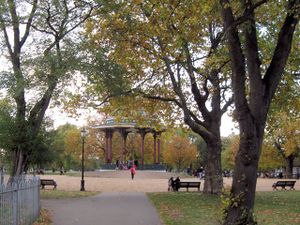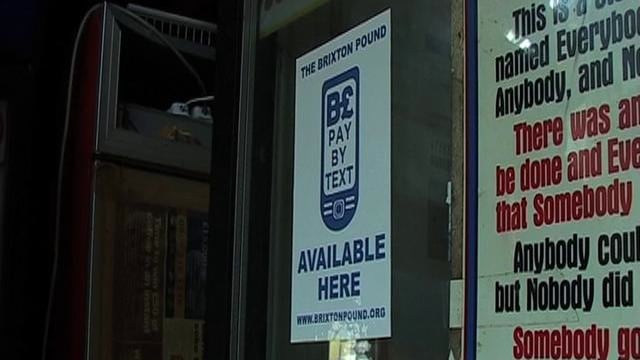
The aim of this page is to recognise, celebrate and encourage the self-empowerment of community agency networks (CANs) and community groups' activism for climate, environment and many other sustainability topics across Lambeth.
Video gallery[edit | edit source]
Networks and sustainability initiatives[edit | edit source]
Community involvement[edit | edit source]
- Lambeth Mutual Aid, added 15:44, 3 July 2020 (UTC)
- Brixton Green, non-profit, registered mutual society, set up by Brixton people. Owned and run by locals
- Open Works, a Lambeth Council project
- Lambeth Co-operative Council wiki
Community resources[edit | edit source]

This article is an offshoot of Lambeth community action focusing on community resources and assets. Resources such as networks, events and community involvement (people and relationships) can be considered as primary resources. Also resources are the activism and physical assets (or what citizens value), such as green spaces and biodiversity, cycle lanes, food initiatives, etc, from the other Lambeth community pages.
Climate action[edit | edit source]
- Lambeth Citizens' Assembly, lambeth.gov.uk. Assembly to be launched in Spring/Summer 2021[1]
- Lambeth for a Cool Planet on facebook
Open spaces[edit | edit source]
The London Borough of Lambeth, in spite of being close to the centre of London has over 64 areas of parks and open spaces, in addition to 34 play areas and eight paddling pools, within its boundaries. In common with all the London boroughs these green spaces provide "lungs" for the leisure pursuits of the inhabitants.
Lambeth is a riverside borough, and one of the largest open spaces is the Thames itself, forming the northern boundary of the borough. A sign posted riverside trail forms a walkway for both pedestrians and cyclists. W
Community currencies activism[edit | edit source]
Brixton Pound
more video: Brixton Pound / Debate Your Plate.com
Summary: Brixton Pound, stimulates the local economy by supporting smaller shops and traders which operate in a challenging economic climate and in competition with larger chains. The currency stays in Brixton and circulates, increasing local trade and community connections.[2]
The Brixton district in South London's Lambeth borough has been a bastion of progressive thought and culture for decades. After the financial crisis of 2008, local businesses were struggling and had trouble securing loans from banks. An area that had once thrived began to stumble.
The Brixton Pound (B£) was launched in 2009 by Transition Town Brixton to support local businesses with a local currency that would "stick to Brixton." The founders of the B£ wanted to create a mutual support system tying residents to local businesses and encouraging business to source locally.
The local borough government, Lambeth Council, was supportive of the B£ from the beginning. It recognized the local currency as a way to develop the community, build local economic resilience, and draw positive attention to the area. According to B£ Communications Manager, Marta Owczarek, "The council's support has greatly helped the B£ start and develop — it would have been very difficult to do what we did without that support. In particular, it acted as a guarantee that the scheme was trustworthy, so local business owners and residents alike felt secure in exchanging their money into and accepting the brand-new local currency."
Within the first six months of the launch of the B£, Lambeth conducted research that estimated the media coverage of the currency generated by the B£ volunteers was worth half a million pounds to the area.
Since 2012, the B£ has "been a live part of the Co-operative Council, working alongside the policy team," according to Owczarek. As a result, the B£ has been able to play an active role in supporting the community while receiving council support. The B£ helped set up community spaces like the Impact Hub in the Town Hall. Lambeth helped the B£ create a mobile electronic payments system, and was also the first council to pay wages in local currency and accept a local currency for taxes. In 2014, the Lambeth Co-Operative Investment Fund gave the B£ funding to start a community lottery program, which was launched in 2015. The lottery increased the circulation of the B£, became an additional revenue source for the B£, and enabled the B£ to fund community projects.
The B£ has also helped Lambeth gain prominence globally and locally. In 2012, thanks to encouragement from the B£, the Council secured funding to join an international project to expand community currencies. On a local level, Lambeth won the Mayor's High Street Fund to install a local currency cash machine, possibly the first in the world.
Community safety[edit | edit source]
Community Police Consultative Group for Lambeth, Independent forum for community and statutory agencies to address community safety and policing issues.
Cycling activism[edit | edit source]
Cycling in Lambeth, news from Lambeth Council
Education for sustainability[edit | edit source]
Urban sustainability[edit | edit source]
West Norwood Feast brings a volunteer powered street market to Norwood Road on the first Sunday of every month
About Lambeth[edit | edit source]
Lambeth ( ) is a London borough in South London, England, which forms part of Inner London. Its name was recorded in 1062 as Lambehitha ("landing place for lambs") and in 1255 as Lambeth. The geographical centre of London is at Frazier Street near Lambeth North tube station, though nearby Charing Cross on the other side of the Thames in the City of Westminster is traditionally considered the centre of London.
References




